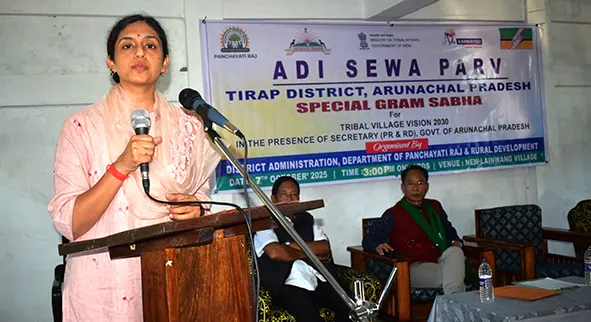KHONSA, 7 Oct: Rural Development and Panchayati Raj Secretary Dr Sonal Swaroop emphasized the importance of participatory planning for sustainable rural development.
Swaroop, who is on a two-day visit here to review the progress and performance under various rural development and panchayati raj initiatives in Tirap district, was addressing a gram sabha at New Lainwang village under Bari-Basip block on Tuesday.
Addressing the gathering, she noted that active participation of all departments is crucial for effective convergence and implementation of schemes based on public needs and feedback. Swaroop urged all line departments to mandatorily attend gram sabhas, expressing concern over frequent absenteeism.
Responding to a public memorandum, she announced the construction of a panchayat bhavan for Jathung village. She also interacted with the villagers and urged them to share their vision for their village over the next five years.
During the meeting, GPC Phorap Sawin deliberated on the preparation of the Gram Panchayat Development Plan (GPDP) 2026-27 based on nine thematic approaches.
Key agenda items discussed included construction of a panchayat bhavan to strengthen local governance infrastructure, promotion of terrace cultivation under the PMKSY and MGNREGA to enhance agricultural productivity and prevent soil erosion, implementation of waste management and hygiene programmes to maintain cleanliness in the village, improvement of educational infrastructure and deployment of adequate teaching staff.
The village poverty reduction plan prepared by self-help groups was also integrated into the GPDP.
The meeting finalized a list of 92 eligible beneficiaries under the PMAY-G and approved the draft GPDP budget for 2026-27, with allocations from various sources, including the 15th Finance Commission, state schemes, and MGNREGA.
Under MGNREGA 2026-27, the gram sabha resolved to undertake works such as the construction of CC roads, protection walls, sanitation facilities, and plantation projects across Lainwang and Jadthung villages.
Additional schemes under the 15th Finance Commission and SOR include the construction of community toilets, urinal sheds, link roads, and drainage systems.
Tirap Deputy Commissioner Techu Aran observed that the villagers’ aspirations, such as improved education, healthcare, water supply, electricity, and roads, are in line with the Government of India’s vision of a developed India by 2047. He urged the villagers to adopt modern skills and technologies for sustainable livelihoods, as traditional farming alone may no longer suffice.
The DC advised the use of bamboo-made dustbins instead of plastic ones to promote local products and protect the environment.
Highlighting the challenges faced by the power department, the DC appealed to all power consumers to clear their outstanding electricity bills and cooperate with the department in implementing the meter-based power supply system in the near future.
PMAY-G nodal officer Tamo highlighted the PMAY-G and clarified doubts among the public.
Bari-Basip ZPM Tediap Hallang created awareness among the villagers about the central and state governments’ flagship schemes/programmes in the Tutsa dialect for better understanding.
The villagers shared their aspirations, such as full coverage under the PMAY-G, improved healthcare facilities with a well-equipped ambulance, installation of solar streetlights, and enhancement of education infrastructure with adequate teaching staff in government schools.
Officers, including the DAO, DHO, MD (ArSRLM), and EE (power) also shared details of their departmental schemes and ongoing challenges.
The meeting was attended by RD Deputy Director NL Naam, BDOs, EOs (REs), GPCs, representatives of the rural development and panchayati raj departments, officials of the agriculture and allied departments, and panchayat technical assistants. (DIPRO)

